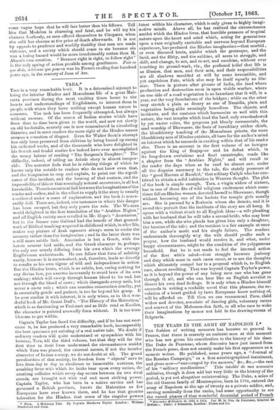TARA.*
Tuts is a very remarkable book. It is a determined aktempt to bring the interior Hindoo and Mussulman life of a great Mali- ratta, province during the most exciting times home to the hearts and understandings of Englishmen, to interest them in people with whom they have nothing except human nature in common. The task has been frequently attempted, but always without success. Of the scores of Indian stories which have from time to time been given to the world, and now rot slowly on old bookstalls, scarcely one is now remembered in circulating libraries, and in most readers the mere sight of the Hiudoo names arouses a sensation of disgust. Even Sir Walter Scott's attempt has only been preserved from oblivion by being bound tip among his collected works, and of the thousands who have delighted in his Scotch and feudal stories few indeed have ever accomplished the weary labour of reading "The Surgeon's Daughter." The difficulty, indeed, of telling an Asiatic story is almost insuper- able. The narrator feels that he is relating things of which he knows only the outside to readers who do not know even that, and the temptation to stop and explain, to point out the signifi- cance of this incident, and the bearing of that custom, and the impossibility of this or that seemingly natural occurrence, is all but irresistible. There is no natural link between the imaginations of the reader and author, and in the effort to supply it the story is usually smothered under a mass of explanation, and the book is neces- sarily dull. There are, indeed, two instances in which this danger has been escaped, but they only prove the rule. The Western world delighted in the first translation of the "Arabian Nights," and all English society once revelled in Mr. Hope's " Auastasius," but in the former case Galland had the benefit of that ground- work of Biblical teaching acquired in childhood which, in after life, makes any picture of Arab planners always seem to excite the memory rather than the imagination ; and in the latter there was n still more subtle link. Anastasius is but a Greek, with the heroic armour laid aside, and the Greek character is, perhaps, the only one utterly differing from his own which the average Englishman understands. He can follow that form of subtlety easily, because it is unrestrained, and, therefore, leads as directly to results as his own vigour of will and independence in action. But the Hindoo brain, which is as subtle, but, caring nothing for any divine law, yet swerves incessantly to avoid laws of its own making; which will sweep throUgh human blood to its end, but not through the blood of cows ; which disregards every oath, but never a caste rule ; which can sanction remorseless cruelty, yet its essentially gentle and patient, is too fir beyond his grasp. If he ever studies it with interest, it is only when, as in that won- derful book of Mr. Grant Duff's, " The History of the Mahrattas," which is as fascinating as Froissart and as little read as Knolles, the character is painted avowedly from without. It is too trou- blesome to get within.
Captain Taylor has faced the difficulty, and if he has not over- come it, lie has produced a very remarkable book, incomparably the best specimen yet existing of a real native tale. We doubt if ordinary readers will quite understand or sympathize with his heroine, Tara, till the third volume, but that they will for the first time iu their lives understand the circumstances amidst which Tara was placed, the external nature, if not the interior -character of Indian society, we do not doubt at all. The grand peculiarities of that society, its freedom from " objects" save to live from day to day in obedience to immutable customs, the crushing force with which its faiths bear upon every action, the crashing collision which every day occurs between its two rival creeds, are brought out with real and most striking power. Captain Taylor, who has been in a native service and has governed a British province, knows the Mahrattas as few Europeans have ever known them, and he has that genuine toleration for the Hindoo, that sense of the singular powers
• Tara. A Mahratta Tale. By Captain Meadows TayloL London : Blackwood and Sons.






























 Previous page
Previous page